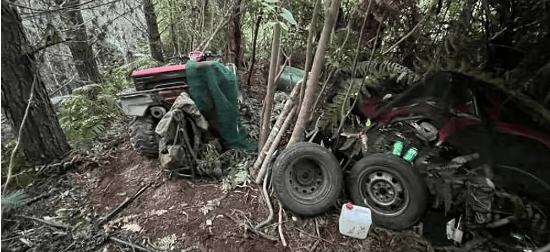The Human Side of Crime
Tom Phillips was shot by a policeman after committing a robbery on a commercial property, after living off grid with his three children for years. To understand why Phillips has committed crimes and obeyed the legal systems, without just assuming he is a madman with no morals, we need to look at what made him do them. He lost custody of his children which made him very emotional. Tom's situation led him to a path of multiple crimes and bad decisions.


To have a functioning society that develops there needs to be a common goal that everyone works against. This is done by creating rules that all have to follow and respect by politicians they preferably have a strong uniting power. Rule breaking has the possibility of underthrowing this order. However, rule breaking can also lead to personal gain and is therefore done by many. Even though rule breaking can never be legally justified, it is morally understandable when driven by deep emotions such as love, fear, or the instinct to protect one’s family.
The reasons for a crime are different for every person. In the article "Understanding Rule Breaking: Antecedents and Consensus? for Better Strategies" (2020) they argue that "Rule breaking is unlikely to be simply a matter of non-compliance or a subject of legality" which means that rule breaking isn’t just about disobeying laws or rules, but also deeper personal reasons. In Tom Phillips case, he is believed to have taken his children to the bush after losing custody over them. Then when food and other necessities had run out the children and dad resorted to theft to get what they wanted. The drive for rule breaking is said to come from rational, emotional, social and identity considerations in the same study.
This rulebreaking can be understood by thinking of how a dad wants to protect children and therefore do anything he can to be with them. A possible reason for taking his children with him to the forest is that the event that caused him to lose custody most likely was highly emotional. Strong feelings tend to affect our ability to act rationally. Since, a dad also wants to protect his children from hunger, it is understandable that Phillips steals food when he has none to give them.
From a rational perspective, Phillips's behavior can be explained by his limited options rather than his disregard of the law. His legal options for keeping in touch with his kids were eliminated after he lost custody of them. Given that the relationship between a father and his children is one of the strongest emotional bonds in the world, this circumstance may seem intolerable to a parent. Phillips came to the logical conclusion that breaking the rules was the only way to maintain the relationship with his children. He believed that his decision to abduct his children and then steal was motivated more by love and survival than by self-interest. This shows how rational thinking, when influenced by powerful emotions, can still lead to actions that society views as criminal.
In conclusion, the acts Tom Phillips did can not be justified by law, but understood by looking at the underlying reasons for his actions. Almost all human actions can be understood this way. Even though the actions are evil on the surface, there are reasons that can contextualise and explain them.
Alex Berger
What the forest saw - Poem of Witness
The morning sun shining through the forest canopy.
Flickering light with every movement.
His eyes were sparkling with life,
but not for much longer.
They called it abduction.
But he called it home.
A father building castles from kindling and fear,
with bedtime stories thick as smoke
and eyes always on watching for the worst.
What is law to a man
who has already lost?
In the hush of the bush,
he taught them how to catch rain,
how to read the stars
as if they were verdicts.
He taught them silence
how it shields and suffocates in equal parts.
They grew,
barefoot and brilliant in the wilderness,
half-wild themselves.
Dreaming of two worlds
they could never hold at once.
When the stomachs were roaring
there was no other choice.
A motor growling through the dark.
The child on the back,
clutching tight,
small hands around his waist wishing for security.
the forest stayed behind,
watching.
The shots came not like thunder,
but like punctuation
in a story no one knew how to end.
They said he fired first.
They always say he fired first.
But who could read his eyes
in that moment,
eyes that had once held
fear,
life
and love.
Let the record show:
He was not a monster.
He was a man
who stepped over the line.
And in that final dawn,
as blue lights flickered through the mist,
he held no flag,
no final word,
only the weight of what he had carried
too long,
too far,
too alone.
Alex Berger
Based on the article New Zealand dad shot dead by police after years on the run with children, BBC news.
